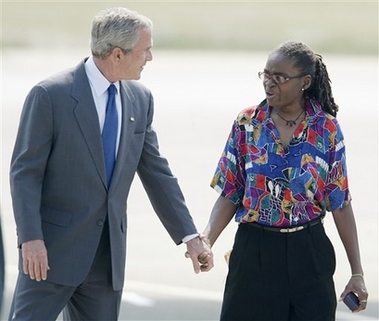Bush stands firm on current Iraq plan
(AP)Updated: 2007-07-11 02:15 Rebuffing Congress, President Bush on Tuesday said he would not give in to ever-mounting calls to start drawing U.S. troops home from Iraq.
 President Bush talks with Gerris Farris after presenting her a Presidential Award for her work in tutoring after arriving at Cleveland Hopkins Airport on his way to speak about the economy and health care at the Cleveland Clinic, Tuesday, July 10, 2007, in Cleveland. [AP]  |
Previewing an afternoon speech, Bush said: "I will remind the people in the audience today that troop levels will be decided by our commanders on the ground, not by political figures in Washington, D.C. — and that we've got a plan to lead to victory."
Bush's comments came as the White House scrambled to respond to a deeply frustrated public and Congress, while also warning that his troop build up needs more time to work.
"I fully understand that this is a difficult war," Bush said after touring a manufacturing plant in Parma, Ohio. "It's hard on the American people. But I will once again explain the consequences of failure to the American people."
Back in Washington, the Senate wrestled with a defense spending bill, including efforts to withdraw troops and other ideas to wind down the war. With Republican support fading, and a new report expected to show little progress, the war continued to hang over Bush.
Meanwhile, Bush was also trying to pressure lawmakers into taking up what's left of his shrinking domestic agenda.
In stops through the Cleveland area, he hoped to draw attention to a strung-together list of topics: energy alternatives, affordable health insurance and restrained spending.
He began with a tour of GrafTech, a maker of graphite products that are used in fuel cells. Bush playfully climbed about a fork lift powered by such a fuel cell. He is promoting alternative fuels as a primary way to reduce U.S. consumption of gasoline.
Later, the president dug into a heaping corned beef sandwich over lunch with community leaders in Cleveland. He was then to visit a nonprofit health clinic and speak about his domestic agenda and Iraq to the city's economic partnership.
Bush's itinerary underlined the White House strategy: get beyond the collapse of immigration reform by focusing on what's next — and blame Congress for inaction.
Even though Democrats run the legislative branch, Bush's own party crushed his bid to legalize millions of unlawful immigrants and strengthen the border. Three-quarters of the Senate's Republicans, including the chamber's leader, voted to derail his immigration bill last month.
The White House sees a chance to regain some advantage in the yearly spending debates. The aim is to simplify the arcane appropriations process into a message that resonates with the public: Bush will stop Democrats from spending too much of the public's money.
Indeed, Bush is itching for a fight and promising vetoes. The Democrats' blueprint would increase spending on federal agencies about $22 billion above Bush's request. He claims it would amount to the largest tax hike in history by allowing some tax cuts to expire.
"The Republican Party has lost a lot of the advantage we used to have," said Charlie Black, a GOP strategist close to the White House. "People used to view Republicans as the party that would keep down spending, keep taxes low and restrain the size of government. This gives us a chance to remind people of the differences."
Beyond his veto authority, Bush has little ability to pressure Congress these days. His public approval rating hovers only around 30 percent. Then again, Congress' rating is just as bad.
The spending matter also gives Bush a chance to tap into another source of public frustration — the sluggish pace in which the Congress often does business. The Senate has yet to pass a single spending bill for the next budget year. The House is further along.
|
|
|
||
|
||
|
|